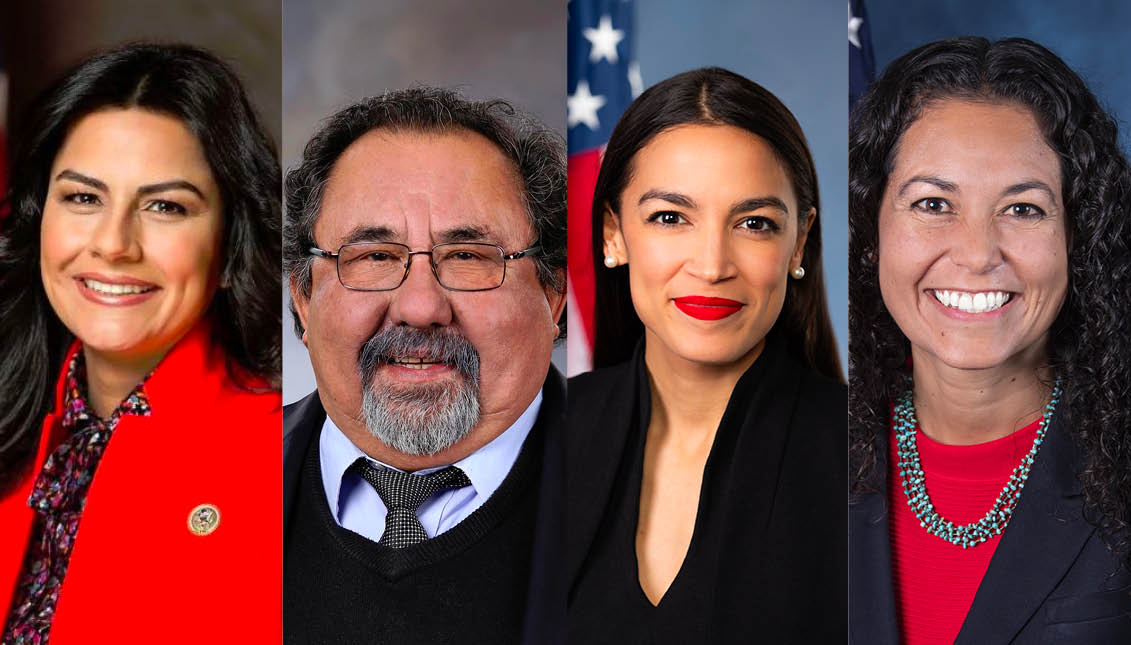
Latinx Reps were among the top Climate crisis fighters of 2020
Reps. AOC, Barragán, Grijalva, and Torres-Small were among the top Climate advocates of the year.
The global climate crisis has called on Latinos to demand action from grassroots organizations to congressional leaders in Washington D.C. The changing climate has already proven that it will affect marginalized groups the most, through both a refugee crisis, and those already in vulnerable positions in the states.
Latinos are the largest ethnic group in California, a state that sees drought and wildfire season intensify on an annual basis. On the Gulf Coast, a record-breaking Hurricane season disproportionately affected Black and Latinx lives through displacement and death.
The world on a whole is currently experiencing extreme weather events impacting those least responsible for creating the climate crisis most.
Latinos as a whole are much more convinced the climate crisis is real and exacerbated by humans. According to a poll by Climate 2020, a staggering 77% of Latino voters support a message of action to respond to the climate.
Democratic Latinx legislators from across the U.S. are answering the call for much-needed action to combat climate change through landmark legislative measures.
Xochitl Torres-Small
The New Mexico Rep. will no longer be representing its 2nd District come 2021, but she’s leaving behind one of the largest wildlife preservation initiatives in the nation’s history.
A big fighter for the environment in her time in office, Torres-Small was one of the original co-sponsors of the Great American Outdoors Act, a massive piece of bipartisan legislation that provided much-needed funding for U.S. National Parks and created a number of conservation jobs.
The Act will provide full and permanent funding to the Land and Water Conservation Fund. It also creates a restoration fund granting millions over the next five years to address years of underfunding for the nation’s public lands.
It has the potential to aid long-neglected parks in California that have been subjected to raging fires in 2020.
Rep. Nanette Barragán
Barragán has been fighting the Climate Crisis on a more local level —where it matters the most.
In 2020, she’s been an advocate for low-income communities in her district, largely Latinx, that have been long-affected by the dangers of climate change and pollution.
Environmental racism has been intensified amid a pandemic that has disproportionately affected Black and Latinx lives. In her own district, the Port of Los Angeles and the surrounding freeways are a huge source of air pollution. While it is an “economic engine,” Barragán is pushing for investment in zero-emissino technology at ports like hers across the nation.
She, along with several Democratic reps urged House Leadership to support a green stimulus investment to be considered within the next COVID-19 relief and recovery package.
Instead, the Senate has adjourned again without providing any sort of stimulus package to aid the nation as it faces another surge in COVID-19 cases, so Barragán’s initiative as it seems, is stuck for the foreseeable future.
Regardless, it increased visibility on how these issues — health disparities, the climate crisis, and racism— are all intertwined. It’s too late for the Climate Crisis to be considered without all of its implications and intersectionality.
Rep. Raúl Grijalva
As Natural Resources Chair, Grijalva (D-AZ) released a sweeping measure to combat the world’s growing Climate Crisis in October, with an ocean-based solution.
RELATED CONTENT
The bill would boost offshore wind energy production, bar new offshore oil and gas drilling, and increase coastal and wetland restoration efforts. The Ocean-Based Climate Solutions Act of 2020 offers a legislative guide for protecting and restoring the nation’s bodies of water. The initiative is rooted in the idea that the Climate Crisis cannot be combatted while ignoring the world’s oceans, which cover over 70% of Earth’s surface.
Coastal communities faced with sea-level rise, harmful algae blooms, and ocean acidification are the most at-risk.
More specifically, Grijalva’s bill would stop offshore drilling, protect ocean habitats, expand renewable energy, support climate-ready fisheries, address ocean health, increase blue carbon and coastal resiliency, and re-engage in international and tribal ocean governance.
However, because Democrats have yet to flip the Senate in 2020 — runoff races in Georgia are pending — much like Rep. Alexandria Ocasio-Cortez’s Green New Deal, Grijalva's bill will see little mobility in a Republican-controlled Senate.
Rep. Alexandria Ocasio-Cortez
The Green New Deal (GND) is perhaps the most iconic climate resolution Congress has seen in the past couple years.
Introduced by Rep. AOC (D-NY) and Sen. Edward J. Markey (D-MA), the proposal calls on the federal government to nudge the United States away from fossil fuels and lessen greenhouse gas emissions across the nation. It also aims to guarantee new high-paying jobs in clean energy.
The GND is nonbinding, so even if Congress approves it, nothing in the proposal would become law.
There’s no other initiative quite like it that would address the Climate Crisis swiftly, while also addressing environmental racism, the economy, and health.
Yet AOC has seen opposition since first introducing the resolution in 2019. Some deem it “too radical” or expensive, and leading Democrats like House Speaker Nancy Pelosi have yet to back it.
In response, supporters argue the damage caused by failing to respond to the climate crisis in adequate time has far outweighed the potential cost of the GND, which at its core is based on efficiency and future prosperity.
When Congress fails to pass it, the Green New Deal could be remembered as the plan that could have saved us.











LEAVE A COMMENT: